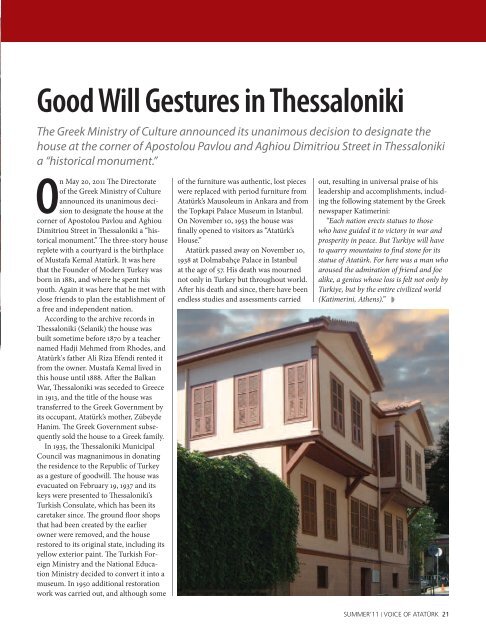Good Will Gestures in Thessaloniki - Ataturk Society of America
Good Will Gestures in Thessaloniki - Ataturk Society of America
Good Will Gestures in Thessaloniki - Ataturk Society of America
You also want an ePaper? Increase the reach of your titles
YUMPU automatically turns print PDFs into web optimized ePapers that Google loves.
<strong>Good</strong> <strong>Will</strong> <strong>Gestures</strong> <strong>in</strong> thessaloniki<br />
The Greek M<strong>in</strong>istry <strong>of</strong> Culture announced its unanimous decision to designate the<br />
house at the corner <strong>of</strong> Apostolou Pavlou and Aghiou Dimitriou Street <strong>in</strong> <strong>Thessaloniki</strong><br />
a “historical monument.”<br />
On May 20, 2011 Th e Directorate<br />
<strong>of</strong> the Greek M<strong>in</strong>istry <strong>of</strong> Culture<br />
announced its unanimous decision<br />
to designate the house at the<br />
corner <strong>of</strong> Apostolou Pavlou and Aghiou<br />
Dimitriou Street <strong>in</strong> Th essaloniki a “historical<br />
monument.” Th e three-story house<br />
replete with a courtyard is the birthplace<br />
<strong>of</strong> Mustafa Kemal Atatürk. It was here<br />
that the Founder <strong>of</strong> Modern Turkey was<br />
born <strong>in</strong> 1881, and where he spent his<br />
youth. Aga<strong>in</strong> it was here that he met with<br />
close friends to plan the establishment <strong>of</strong><br />
a free and <strong>in</strong>dependent nation.<br />
Accord<strong>in</strong>g to the archive records <strong>in</strong><br />
Th essaloniki (Selanik) the house was<br />
built sometime before 1870 by a teacher<br />
named Hadji Mehmed from Rhodes, and<br />
Atatürk's father Ali Riza Efendi rented it<br />
from the owner. Mustafa Kemal lived <strong>in</strong><br />
this house until 1888. Aft er the Balkan<br />
War, Th essaloniki was seceded to Greece<br />
<strong>in</strong> 1913, and the title <strong>of</strong> the house was<br />
transferred to the Greek Government by<br />
its occupant, Atatürk’s mother, Zübeyde<br />
Hanim. Th e Greek Government subsequently<br />
sold the house to a Greek family.<br />
In 1935, the Th essaloniki Municipal<br />
Council was magnanimous <strong>in</strong> donat<strong>in</strong>g<br />
the residence to the Republic <strong>of</strong> Turkey<br />
as a gesture <strong>of</strong> goodwill. Th e house was<br />
evacuated on February 19, 1937 and its<br />
keys were presented to Th essaloniki’s<br />
Turkish Consulate, which has been its<br />
caretaker s<strong>in</strong>ce. Th e ground fl oor shops<br />
that had been created by the earlier<br />
owner were removed, and the house<br />
restored to its orig<strong>in</strong>al state, <strong>in</strong>clud<strong>in</strong>g its<br />
yellow exterior pa<strong>in</strong>t. Th e Turkish Foreign<br />
M<strong>in</strong>istry and the National Education<br />
M<strong>in</strong>istry decided to convert it <strong>in</strong>to a<br />
museum. In 1950 additional restoration<br />
work was carried out, and although some<br />
<strong>of</strong> the furniture was authentic, lost pieces<br />
were replaced with period furniture from<br />
Atatürk’s Mausoleum <strong>in</strong> Ankara and from<br />
the Topkapi Palace Museum <strong>in</strong> Istanbul.<br />
On November 10, 1953 the house was<br />
fi nally opened to visitors as “Atatürk’s<br />
House.”<br />
Atatürk passed away on November 10,<br />
1938 at Dolmabahçe Palace <strong>in</strong> Istanbul<br />
at the age <strong>of</strong> 57. His death was mourned<br />
not only <strong>in</strong> Turkey but throughout world.<br />
Aft er his death and s<strong>in</strong>ce, there have been<br />
endless studies and assessments carried<br />
out, result<strong>in</strong>g <strong>in</strong> universal praise <strong>of</strong> his<br />
leadership and accomplishments, <strong>in</strong>clud<strong>in</strong>g<br />
the follow<strong>in</strong>g statement by the Greek<br />
newspaper Katimer<strong>in</strong>i:<br />
“Each nation erects statues to those<br />
who have guided it to victory <strong>in</strong> war and<br />
prosperity <strong>in</strong> peace. But Turkiye will have<br />
to quarry mounta<strong>in</strong>s to fi nd stone for its<br />
statue <strong>of</strong> Atatürk. For here was a man who<br />
aroused the admiration <strong>of</strong> friend and foe<br />
alike, a genius whose loss is felt not only by<br />
Turkiye, but by the entire civilized world<br />
(Katimer<strong>in</strong>i, Athens).” w<br />
SUMMER’11 | VOICE OF AtAtüRk 21


